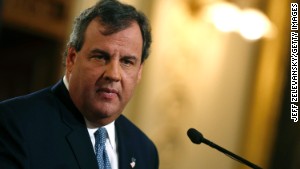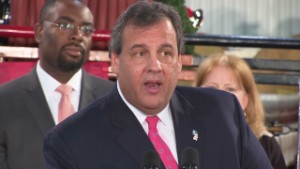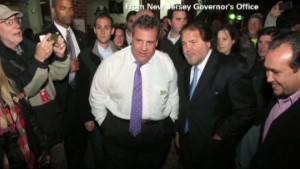Editor's note: Julian Zelizer is a professor of history and public affairs at Princeton University. He is the author of "Jimmy Carter" and "Governing America."
(CNN) -- After a very long week, there has been a little light at the end of the bridge for New Jersey Gov. Chris Christie. Some polls recently suggested that the scandal surrounding the three lanes to the George Washington Bridge might not have as much traction with the public as it does with reporters.
Although his job approval ratings have fallen dramatically, his numbers are still pretty decent with 55% of those polled by Quinnipiac University saying that he is doing a good job (a fall from 74% in February 2013, which was still relatively soon after his high-profile, and praised, performance in Superstorm Sandy).
According to the Pew Research Center, only 18% of people nationally reported that they had paid attention to Christie's news conference about the bridge incident; 60% said that their opinions of the governor had not changed.
The polls are certainly not enough to give Christie reason to breathe easily. They can change very quickly depending on how news unfolds. This is also a very dynamic story with more revelations about other kinds of activities by the governor's staff and the governor himself that could prove to be more damaging. In fact, this past weekend, news reports told of allegations that Gov. Christie's office had prevented Hoboken Mayor Dawn Zimmer from receiving hurricane relief money until she helped move forward a major redevelopment project.
But it is also possible to see how Christie can survive this scandal, and even rebound, ending up in a stronger position than where he started.
 Julian Zelizer
Julian Zelizer The path to recovery might involve the governor turning attention on the investigators rather than the subject of the investigation. This is a strategy that many politicians have used quite successfully. In an age where there is intense partisanship, public distrust in government and a news media perceived as scandal-obsessed and politically biased, this strategy can work well.
During the late 1990s, President Bill Clinton turned the impeachment proceedings on their head by charging that the entire investigation was driven by the partisan interests of Republicans such as Newt Gingrich and Tom DeLay rather than the interests of the nation. During the Republican primaries in 2012, candidate Gingrich successfully attacked reporters as a way to deflect questions about his past.
Christie might be able to do the same. That he is a "red governor" in a blue state can actually turn to his advantage.
At a certain point, if the initial revelations don't lead to more, Christie can try to persuade the public that state Democrats are driving this process to bring down a governor who has proved to be enormously popular.
Given the reputation of New Jersey as a notoriously corrupt state filled with tales of wrongdoing by members of both parties -- for example, Democratic Mayor Tony Mack of Trenton was arrested after an FBI investigation into allegations of bribery, extortion and more -- many Americans inside and the state and out might end up wondering what's so different about this story than all the others they hear daily.
The governor can also spin this as a story about national Democrats who are trying to bring down a potential Republican rival in 2016. Politico recently reported how the Democratic National Committee has been unleashing an aggressive attack on the governor since December in an attempt to define this politician for Americans as less a maverick than a bully.
 Subpoenas readied in Gov. Christie probe
Subpoenas readied in Gov. Christie probe  Christie addresses challenges ahead
Christie addresses challenges ahead  Gov. Christie's latest poll numbers
Gov. Christie's latest poll numbers If Democrats are not careful, Christie can also show himself to be the person more interested in governance than politics, flipping the story against his opponents. In his State of the State Address, Christie tried to lay out a number of policy issues that he wants to tackle in the coming year, many revolving around the length of the school day and school year. But making a speech is one thing, moving forward with a policy agenda is another.
If Christie can keep himself in New Jersey long enough and avoid the temptation of going out on the campaign trail, he could push forward with these and other ideas that are of great interest to New Jersey residents. The more that he can show himself to be concerned with the health of residents in the state and turn the debate toward policy, the better he can bolster the image he has built of being a chief executive whose primary concern is getting things done regardless of the politics involved.
This is the image that came out of Superstorm Sandy and is one that might be repeated in this highly charged environment. If the ongoing investigations don't turn up anything new to implicate the governor, Christie will say that he is the one who held people accountable and moved forward with leadership while his opponents whipped up scandal politics.
Timing is everything in politics. And the timing of this scandal might work in Christie's favor.
The scandal broke after his re-election and a long time before the Republican primaries for the 2016 election. The good thing for politicians in the U.S. is that the attention span of Americans is extremely short.
We have seen repeatedly how there can be intense, almost obsessive, fascination with a scandal (remember the IRS?) that can seem like the end of the world for the person involved, but soon it is forgotten. Americans are so saturated with stories about wrongdoing that there is a kind of numbness that develops. After some time, the nation moves on unless some devastating smoking gun brings a person down.
Within a few months, it is very possible that the public is not talking about this anymore. While Christie's reputation might be damaged and the image he crafted after Superstorm Sandy will not be as pristine, the news won't be about these lanes any more. Christie will always have to contend with questions about this, but the intensity will greatly diminish by the time that the governor really takes the nation stage.
Should he survive, this entire episode will also give Christie much tougher skin and more seasoned approach to handling these types of situations closer to the presidential election. He might also win back the media to this side since the only thing that reporters love better than the story of a political collapse is the story of a political comeback.
None of this is to say that the scandal is not serious or that this can't potentially cause immense damage to the governor. One e-mail revealing the governor actually knew about all of this would be devastating. Yet anyone who follows politics understands that this story could end up being a bridge to nowhere, and Christie can still emerge as the top Republican contender in 2016.
Follow us on Twitter @CNNOpinion.
Join us on Facebook/CNNOpinion.
{ 0 comments... read them below or add one }
Post a Comment